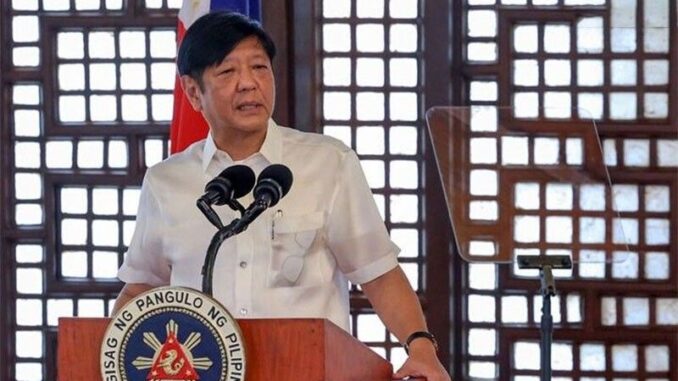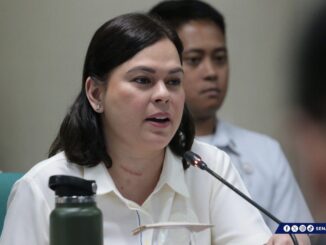
MANILA, Philippines — House lawmakers expressed confidence in President Ferdinand Marcos Jr., saying they do not expect him to veto the Congress-approved P26 billion budget for the Ayuda sa Kapos ang Kita Program (AKAP).
Rep. Jil Bongalon (Ako Bicol Party) on Wednesday, December 18, said that he believes the financial assistance program for low-income earners “directly benefits the people.”
“Well, I personally also don’t believe that the fund allocated for AKAP will be vetoed by the president. You know, this is one of the programs that addresses our countrymen’s problems,” he said in a mix of English and Filipino at a press conference.
AKAP is one of the Department of Social Welfare and Development’s (DSWD) programs providing rice, food, medical, funeral or cash relief assistance.
Bongalon, an appropriations committee vice chair and a member of the bicameral conference committee, added that AKAP provides the government “one way” to return taxpayer’s money to the people.
“Nababalik natin ‘yung kanilang mga buwis sa kanilang mga kontribusyon sa ating programa sa pamamagitan ng programa (AKAP),” he said.
(We are giving back the taxes people paid as a contribution to our programs through the AKAP.)
The lawmaker also recounted how the program provided immediate relief to his constituency in Bicol after the train of cyclones in October and November barreled through the region.
“I can speak for my constituents in Bicol. The region was battered by two, three typhoons the past month and AKAP saved them. … We cannot always rely on the relief goods that our government agencies and private organizations provide,” he said.
As of November 20, the DSWD said in a statement that P20.7 billion of the P26.77 billion budget for AKAP in 2024 has already been utilized to provide assistance for over four million beneficiaries.
Need for a ‘stop-gap measure’
Rep. Geraldine Roman (Bataan, 1st District) shared a similar view that Marcos will not have issues with the AKAP budget. She said that district representatives in Congress have expressed how significantly helpful the program has been.
“I personally believe that the president won’t veto the program (AKAP) because feedback from our district congressmen is that it is really helpful,” she said in a mix of English and Filipino.
Roman also mentioned that DSWD’s programs “cover the poorest of the poor,” citing the 4Ps or Pantawid Pamilyang Pilipino Program which also provides cash assistance.
She, however, also acknowledged that the AKAP is a “stop-gap measure” or band-aid solution to systemic economic issues.
“Of course, we know it’s a stop gap measure. Hopefully, there is higher pay, there are more jobs — economic progress as a whole. But in the meantime, what will we do, just watch?” Roman said.
“And AKAP, I think, is the answer,” she added.
The bicam recently approved a P21 billion AKAP budget for the lower chamber, considering its hundreds of district and sectoral representatives, and P5 billion for the Senate.
The program was criticized that it may be used as a “pork barrel,” providing legislators with discretionary funds at their disposal.
Bongalon, however, denied this allegation saying that DSWD is AKAP’s “sole implementor” and that lawmakers will not hold the funds to be used.
RELATED: House leader denies P26-B AKAP a form of ‘pork barrel’
Respect for Marcos’ veto power
In a statement, appropriations chairman Rep. Elizaldy Co (Ako Bicol Party) said that Marcos’ decision to review the 2025 national budget and postpone its signing exhibits an “effective system of checks and balances” in government.
Co also mentioned that Congress is “ready to collaborate” in revising the budget to ensure it aligns with the country’s priorities.
Rep. Jude Acidre (Tingog Party-list) also said that the lower chamber “will respect the president” regardless of the budget line items he wishes to veto or revise.
He said he just hopes that Marcos’ decision “will be based on the program’s merits.”
Executive Secretary Lucas Bersamin announced on Wednesday morning that Marcos will not be signing the bicam’s final version of the 2025 national budget as originally scheduled on December 20.
Bongalon, Roman and Acidre said they welcome the president’s decision, saying he has all the right to exercise his veto power over the 2025 General Appropriations Bill. Congress, however, may also override Marcos’ veto by securing a two-thirds vote in both the House and Senate.
The fact that the executive branch is eyeing an “exhaustive” review of the bill before signing it is a sign that democracy is up and running in the country, Acidre added.





Be the first to comment